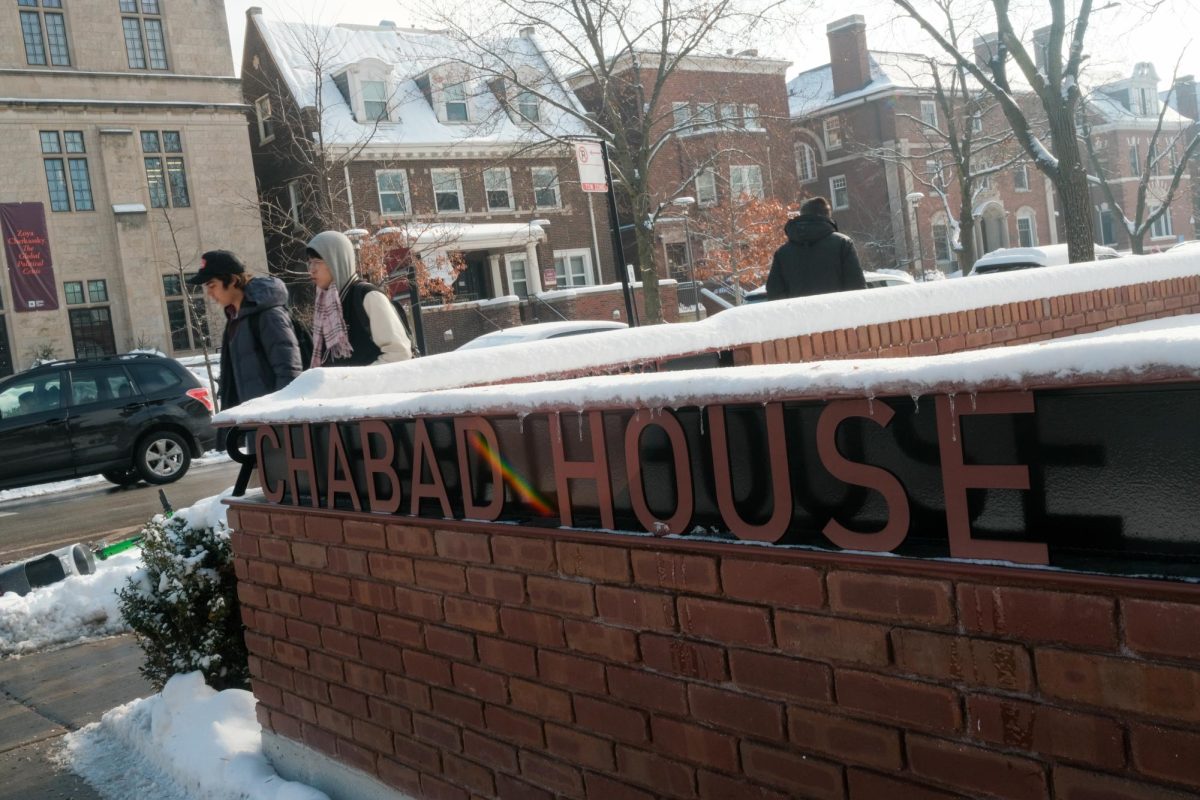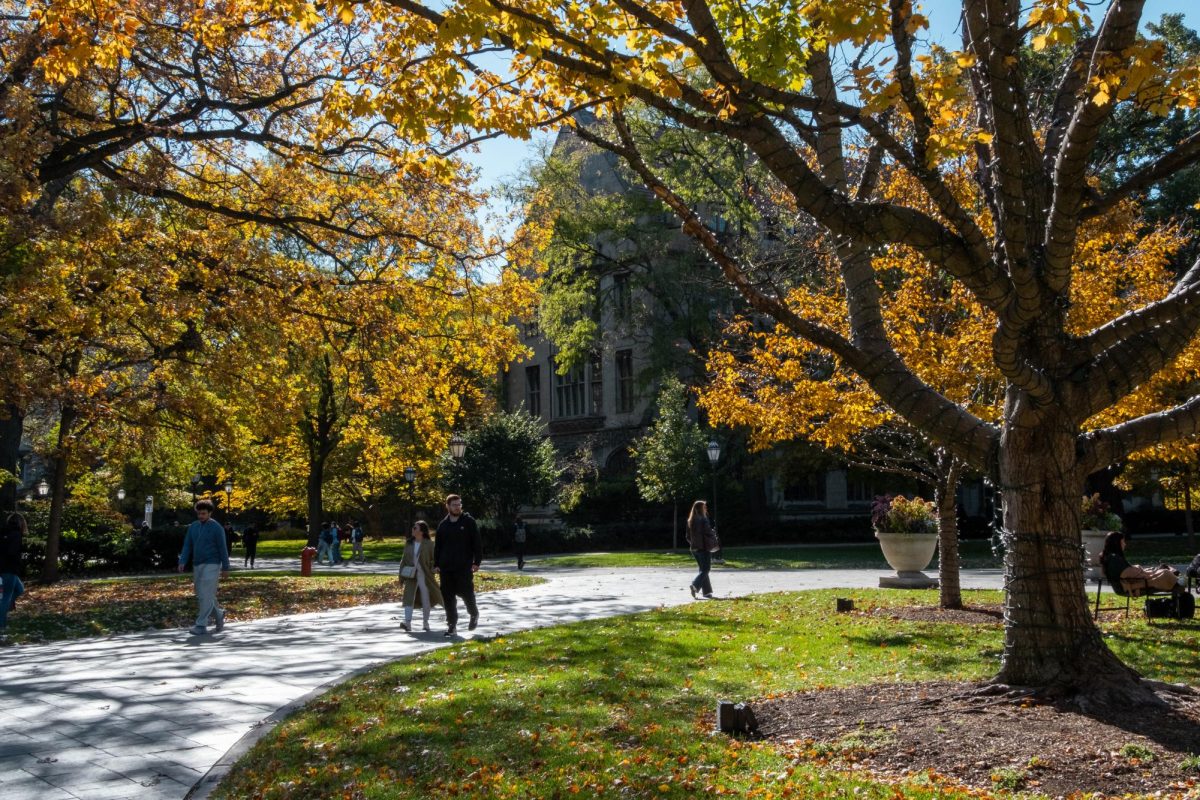Subscribe here to receive this newsletter in your email inbox.
Good Wednesday morning. It’s summer.
Construction: A 16-story office building is going up in Harper Court, developers announced last week. The University of Chicago is expected to occupy 50,000 feet of the building, roughly a third of the entire tower, according to DNAInfo. Construction on the building, which will house a significant expansion of the University’s Polsky Center for Exchange and Innovation, is expected to be finished in 2020.
Zimmer’s WaPo campus speech event: University of Chicago president Robert Zimmer and Brown University president Christina Paxson discussed free speech at a Washington Post event in D.C. yesterday. A highlight:
- Paxson: “When I look at Brown students…I don’t see students who are asking for protection. I just don’t. I see students who are very concerned about a set of issues in the world right now. They’re concerned about racism, they’re concerned about equity, they’re concerned about politics, any number of things. They’re not shying away from hard issues…. But I don’t see students asking for protection because they’re scared or they feel fragile.”
- Zimmer: “I’m less sanguine on that point. After my editorial in the Wall Street Journal that brought this whole issue up, I received a number of notes from students at other universities saying that they wanted to say such things, but were advised by their fellows that they would be ostracized for saying such things. I hear this from students around the country all the time. I hear it from faculty all the time that, in fact, they are nervous about what they have to say.… ”
The Department of Education is scaling back its investigations into civil rights complaints, according to an internal memo sent to ProPublica. Universities under investigation will no longer be required to turn over three years of data for the department to examine whether there’s been a pattern of non-compliance with civil rights laws. The department says the new guidance will increase efficiency and help “clear out the backlog” of complaints. This shift could certainly affect the University of Chicago—the department has at least three active investigations into the University of Chicago (one of which dates back to 2013) responding to complaints that allege discrimination on the basis of sex, according to the Chronicle of Higher Education’s Title IX tracker. And The Maroon reported that the department opened a Title IX athletics investigation into the University last year in response to a since-withdrawn complaint alleging unequal treatment of male and female athletes.
- More from the ProPublica story: “Under the Obama administration, the department’s office for civil rights applied an expansive approach to investigations. Individual complaints related to complex issues such as school discipline, sexual violence and harassment, equal access to educational resources, or racism at a single school might have prompted broader probes to determine whether the allegations were part of a pattern of discrimination or harassment.… The new memo, sent by Candice Jackson, the acting assistant secretary for civil rights, to regional directors at the department’s civil rights office, trims this approach….The office will apply the broader approach ‘only’ if the original allegations raise systemic concerns or the investigative team argues for it, Jackson wrote in the memo.”
University rents green line stop: Last Wednesday CTA announced that it will turn over the historic Garfield green line stop to Theaster Gates and the University as part of continued Arts Block development, according to DNAInfo. Gates’ intends to turn it into a kiosk for information about the neighborhood, and it is scheduled to open in late 2018. The University plans to invest $219,000 into the renovation. The Maroon spoke last month to members of the Woodlawn Historical Society, who wanted to use the building as their headquarters: “Now the community is pitted against the money of the University,” Cecilia Butler, the president of the society, said then, of their competing bid.
Build Coffee opens in Experimental Station: Build Coffee, a combination cafe and bookstore, will open this Saturday. The store is owned by two alumni, Hannah Nyhart and Bea Malsky, both graduates of the Class of 2015. Last fall, the pair raised over $16,000 on Kickstarter to fund their venture. The store will have a venue for performances and opportunities for local writers and artists to sell their products.
Deadlock broken in health care network contract: The University has reached an agreement with UnitedHealthcare, Illinois’s largest healthcare insurer, only a few days before their contract was set to expire at the end of the month, according to the Tribune. The successful contract negotiation will allow more than 8,000 current patients of University of Chicago Medicine to continue to pay in-network rates for care. Both parties had not been optimistic just a week ago that contract negotiations would be fruitful, leaving many UnitedHealthcare customers worrying over whether they could afford care starting next month.
Sen. Chuck Grassley (R-IA) praised the University of Chicago’s speech principles in his opening remarks at a Senate Judiciary Committee hearing yesterday about free speech on college campuses in which he argued that the First Amendment is “under assault” on many campuses.
- “Fortunately, not all schools adopt the censorship approach. The University of Chicago has adopted a policy that some other universities have followed, which I will also put in the record. This policy prohibits the university from suppressing speech that even most people on campus would find offensive or immoral. It calls for counter-speech rather than suppression by people who disagree with speech. And while protecting protest, it expressly prohibits “obstruct[ing] or otherwise interfer[ing] with the freedom of others to express views they reject or even loathe.” Finally, it commits the university to actively “protect that freedom when others attempt to restrict it.”
Paul M. Rand has been named the University’s new vice president for communications, effective August 1. The announcement does not make any mention of the incumbent John Longbrake’s plans.
Law School professor key player in upcoming SCOTUS case: A University of Chicago Law School professor’s research and litigation could shape how the Supreme Court views the constitutionality of partisan gerrymandering in a potentially landmark case that the court announced on Monday it was hearing.
- The case, Gill v. Whitford, was originally heard by the U.S. District Court of the Western District of Wisconsin. Law School professor Nicholas Stephanopoulos used his research, which involved creating a novel standard to empirically measure the extent of partisan gerrymandering, to argue as an attorney for the plaintiffs in Gill that politically motivated redistricting was unconstitutional under the 14th Amendment’s equal protection clause and the First Amendment’s freedom of association. The District Court agreed with Stephanopoulos’s reasoning and ruled in favor of the plaintiff. Wisconsin appealed the decision, which ultimately led to Monday’s announcement. Stay tuned for further Maroon coverage…
Fermilab Celebrates 50th Anniversary: The laboratory opened in 1967 as the “National Accelerator Laboratory” and was renamed after Enrico Fermi in 1974. Fermilab houses the Tevatron, the world’s fourth-largest particle accelerator.
New named IME and MBL professor: Professor Jeffrey Hubbell, who was serving as the Barry L. MacLean Professor of Molecular Engineering Innovation and Enterprise at the University, has been named the inaugural Eugene Bell Professor in Tissue Engineering. This new named professorship was created after a $3.5 million donation from the Millicent and Eugene Bell Foundation in memory of Eugene Bell, an MIT professor, to promote innovative tissue engineering research at the Institute of Molecular Engineering and the University-affiliated Marine Biological Laboratory in Woods Hole, MA.








